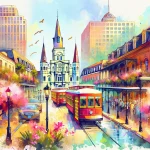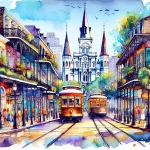New Orleans, a city that pulses with life, is home to an intertwined tapestry of cultures, traditions, and people. With a population of nearly 400,000, the city boasts a rich history and a spirit that captivates visitors from around the world. Appreciating the unique culture of New Orleans is essential to truly understanding the essence of this remarkable city.
In This Article
TL;DR
- New Orleans is a melting pot of diverse influences, including African, French, Spanish, and Caribbean traditions.
- The city is renowned for its thriving music and arts scene, with jazz being a significant part of its cultural identity.
- New Orleanians are known for their warm hospitality, resilience, and strong sense of community.
Cultural Melting Pot
New Orleans is a true cultural melting pot, with influences from Africa, France, Spain, and the Caribbean shaping its distinct identity. The city’s Creole and Cajun heritage is evident in its cuisine, music, architecture, and customs. Creole culture, born from the blending of African, European, and Native American influences, is characterized by a love for food, family, and celebration. Cajun culture, with its roots in the French-speaking Acadian immigrants from Canada, brings a unique flavor to the city’s music, food, and language.
The city’s African American community has played a significant role in shaping its cultural landscape. From the rhythms of jazz and blues to the vibrant street art and the colorful Mardi Gras Indians, African American traditions are deeply woven into the fabric of New Orleans.
Festivals and Celebrations
New Orleans is famous for its lively festivals and celebrations, with Mardi Gras being the most well-known. This annual carnival, which takes place in the weeks leading up to Ash Wednesday, is a time of joyous parades, colorful costumes, and street parties. The history of Mardi Gras in New Orleans dates back to the late 17th century, when French settlers brought the tradition to the city.
Another iconic event is the New Orleans Jazz & Heritage Festival, or simply Jazz Fest. This annual celebration showcases the city’s rich musical heritage, featuring both local and international artists across multiple genres, including jazz, blues, R&B, and gospel. The festival also highlights Louisiana’s unique cuisine and crafts.
Throughout the year, New Orleans hosts numerous other festivals and events that bring the community together, such as the French Quarter Festival, the Essence Festival, and the Voodoo Music + Arts Experience.
Music and Arts
New Orleans is widely regarded as the birthplace of jazz, a musical genre that emerged in the late 19th and early 20th centuries. Jazz grew out of the city’s diverse musical traditions, blending African rhythms, European harmonies, and American popular music. Legendary musicians like Louis Armstrong, Sidney Bechet, and Jelly Roll Morton helped shape the sound of early jazz and put New Orleans on the map as a musical mecca.
Today, the city’s music scene continues to thrive, with live performances at iconic venues like Preservation Hall, Tipitina’s, and the Spotted Cat Music Club. Street musicians and brass bands are a common sight in the French Quarter and other neighborhoods, adding to the city’s vibrant atmosphere.
New Orleans also boasts a thriving visual arts scene, with numerous galleries, museums, and public art installations showcasing the work of local and international artists. The New Orleans Museum of Art (NOMA) is a must-visit destination, with an extensive collection of French and American art, as well as African and Japanese works.
Culinary Delights
New Orleans is renowned for its distinctive cuisine, which blends African, French, Spanish, and Native American influences. Iconic dishes like gumbo, jambalaya, and po’boys are a testament to the city’s rich culinary heritage.
Gumbo, a hearty stew typically made with seafood or meat, vegetables, and a dark roux, is a staple of New Orleans cuisine. Each family and restaurant has its own unique recipe, often passed down through generations.
Po’boys, a type of sandwich served on French bread, are another beloved New Orleans specialty. Originally created to feed striking streetcar workers in the 1920s, po’boys can be filled with a variety of ingredients, from fried seafood to roast beef and debris (the flavorful bits of meat that fall off a roast).
The city is home to numerous famous restaurants, such as Dooky Chase’s Restaurant (Address: 2301 Orleans Ave, New Orleans, LA 70119, Phone: (504) 821-0600), known for its Creole cuisine and its role as a gathering place during the Civil Rights Movement, and Commander’s Palace (Address: 1403 Washington Ave, New Orleans, LA 70130, Phone: (504) 899-8221), a landmark restaurant serving refined Creole dishes in a historic Garden District setting.
Resilience and Community
New Orleans has a history of overcoming challenges, from natural disasters like Hurricane Katrina to economic hardships. The city’s residents have demonstrated remarkable resilience and a strong sense of community in the face of adversity.
After Hurricane Katrina devastated the city in 2005, New Orleanians banded together to rebuild their homes, businesses, and cultural institutions. The city’s recovery has been a testament to the strength and determination of its people.
This sense of community is evident in the way neighbors support one another, whether it’s through sharing a pot of gumbo or helping to rebuild a storm-damaged home. The city’s many neighborhood associations and community organizations play a vital role in preserving the city’s unique character and heritage.
Hospitality and Warmth
New Orleanians are known for their warm hospitality and welcoming nature. The city’s tourism industry is a significant part of its economy, and residents take pride in sharing their culture and traditions with visitors.
Stories of kindness and generosity abound in New Orleans, from the stranger who offers directions to a lost tourist to the restaurant owner who provides a free meal to a hungry musician. This spirit of openness and generosity is a defining characteristic of the city and its people.
Embracing the New Orleans Way of Life
To truly embrace the New Orleans way of life, one must adopt the city’s laid-back, “laissez les bons temps rouler” (let the good times roll) attitude. This philosophy is about living in the moment, enjoying life’s simple pleasures, and celebrating the city’s rich cultural heritage.
New Orleans is a city that balances tradition with innovation and progress. While deeply rooted in its history, the city is also constantly evolving, with new restaurants, music venues, and art spaces emerging alongside centuries-old institutions.
Visitors and residents alike have countless opportunities to immerse themselves in the city’s culture, from attending local festivals and events to supporting community organizations and learning about the city’s history.
Getting Involved
To fully experience the people and culture of New Orleans, it’s essential to get involved in the community. Attend local events, such as the Mardi Gras Indians’ Super Sunday parade or the weekly concerts at Armstrong Park, and support local businesses and artists.
Learning about the city’s history and cultural significance is also crucial. Visit museums like the Historic New Orleans Collection (Address: 520 Royal St, New Orleans, LA 70130, Phone: (504) 523-4662) and the New Orleans African American Museum (Address: 1418 Governor Nicholls St, New Orleans, LA 70116, Phone: (504) 566-1136) to gain a deeper understanding of the city’s complex past and present.
When participating in New Orleans’ unique traditions, it’s important to do so respectfully. For example, when attending a second line parade, join in the celebration but be mindful of the cultural significance of the event and the community’s traditions.
By embracing the people and culture of New Orleans, one can experience the true essence of this remarkable city. From its vibrant music and arts scene to its delicious cuisine and warm hospitality, New Orleans offers a way of life that is unlike any other. By immersing oneself in the city’s traditions, supporting its communities, and adopting its laid-back attitude, one can truly appreciate the magic of New Orleans and the resilient spirit of its people.






